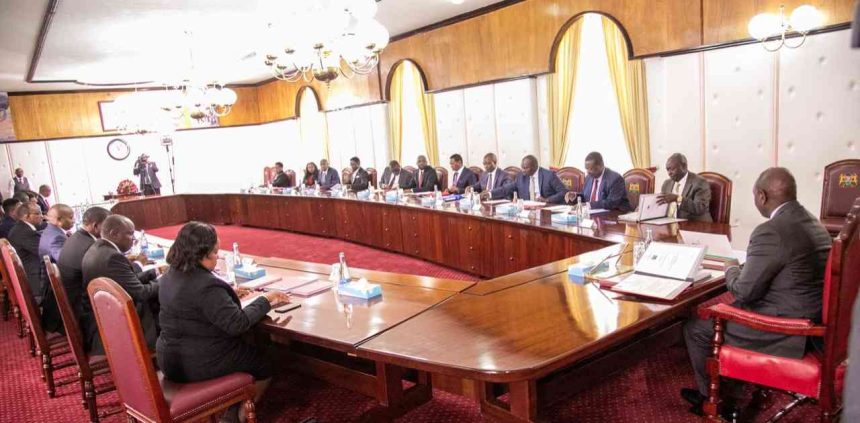President William Ruto’s first-ever Cabinet meeting passed a resolution that gave blessings to an importation deal that has seen private firms import oil tax-free, then sell the commodity to a government agency at a higher price, an NTV investigation has revealed.
Documents in our possession show how companies associated with insiders of Dr Ruto were single-sourced to procure oil for the Kenya National Trading Corporation (KNTC) in a series of tricks where Kenyans stand to lose at least Sh6 billion.
Taxpayers, analysis shows, could lose another Sh10 billion in unlawful tax exemptions related to oil imports. The simple anatomy of the scheme is: A need is created to import oil tax-free. Then somehow, private firms get to import the oil, rather than have a government agency do that.
Those firms then sell the imports to the government agency. The agency then sells that oil through other private firms. Eventually, that imported oil is sold for more than the price of locally manufactured ones. Throughout these movements, massive wastage of cash happens.
Now, dozens of documents in our possession can now confirm that both the National Treasury and Kenya Revenue Authority (KRA) applied the wrong provisions of the law to approve the imports.
We have obtained a circular from Treasury Cabinet Secretary Njuguna Ndung’u to the KRA that approved the duty-free importation. It was copied to Mr Kuria and Mr Linturi.
That, and an internal memo by KRA, are misleading by citing section 114 (2) of the East African Community Customs Management Act, 2004, and paragraph 20 (b) of the fifth schedule of the Act for the approvals.
The Treasury circular states in part: “In view of the above, the Cabinet Secretary, the National Treasury and Economic Planning on January 20, 2023, approved the duty-free importation of the above-mentioned products by KNTC in line with paragraph 20 of part (b) of the fifth schedule of the East Afri-can Community Customs Management Act.”
On the other hand, the KRA memo states: “The approval is in accordance with the provisions of sec 114(2) of East African Customs Management Act, 2004 and the provisions of paragraph 20 of part of the fifth schedule to the act.”
Departure from law
The leaked document is a departure from the law it purports to follow. Section 114 (2) of the East African Community Customs Management Act states: “Duty shall not be charged on the goods listed in part (b) of the fifth schedule to this Act.”
The mentioned part of the fifth schedule, however, relates to emergencies. It is specific to “relief goods imported for emergency use in specific areas where natural disaster/calamity has occurred in a partner state, goods for emergency relief purposes of such quantities and within a specified period imported by the government or its approved agent or a non-governmental organisation or a relief agency”.
At least with that, we see that there is no provision in the law that empowers the Treasury Cabinet Secretary to waive duty under the Act except for emergency relief goods. And even then, it must be with the express approval of the East African Council of Ministers and published in the EAC gazette notice. Any such tax waiver must be expressly approved by Parliament.
NTV has also established that KRA wrongly used a notice in the Kenya Gazette of November 21, 2022, to give a nod to its officials to clear the imported oil. But it is a misleading reference, given the fact that the gazette notice used was issued by the President under Order Number 2 of 2022 to form the National Steering Committee on Drought Response.
It is not clear why KRA, despite having this information, used the wrong gazette notice.
CS reply
Prof Ndung’u had an answer when we asked about this. “We are complaining about the cost of living, aren’t we? So, that is one avenue of saying that in the short term, let us import duty-free so that we lower the cost, we bring in the supplies in the market while we wait for our season to come through,” he said.
Among the companies awarded the local purchase order were Shehena Trading Commodity Limited, Purma Holdings Limited, Multi Commerce FZC, and Charma Holdings Limited.
In the first consignment that arrived in Mombasa in early April 2023, the importers’ landed cost for a 20-litre jerrycan of cooking oil was $20 (Sh2,740). KNTC bought from the importers CIF Mombasa at a price of $26 (Sh3,618), excluding VAT.
In simple terms, the importers will pocket $6 per jerrycan of oil brought into the country. At the end of it all, they will earn a massive $41,500,000 (Sh5,651,250,000) from the import of the 125,000 metric tonnes.
Documents in our possession show that at the first delivery of 300 containers at the Mombasa port, KNTC paid 16 per cent VAT but not custom duty and other levies.
The cost per jerrycan to the KNTC, when VAT is included, amounts to Sh4,197. This is before adding other port charges.
If KNTC were to sell these products to the distributors, wholesalers and retailers as mandated, they would have to sell it to them at 4,197 shillings plus 16 per cent VAT, which amounts to Sh4,869.
It is worth noting that a 20-litre jerrycan of locally manufactured brands that are not exempted from tax retails at Sh4,100 in Nairobi.
NTV can confirm that two of the key distributors which were retained by the government to distribute the products in their online platforms – Twiga Foods and Market Force – listed Oki oil which was imported from Malaysia at Sh4,099, inclusive of VAT, last week. This is well below the cost to KNTC. Which begs the question: At what price did Twiga and Market Force buy the product from KNTC?
Twiga’s net price without VAT will be Sh3,533, even without considering their margin. If KNTC sold the product to Twiga at Sh3, 533, and its cost is Sh4,869, the loss per jerrycan to the government through KNTC is Sh1,336 per jerrycan. If KNTC imports the entire 125,000 metric tonnes, taxpayers will incur a loss of over Sh9 billion. Both Twiga Foods and Market Force, two leading online distributors with a large retail network, pulled the product from their sites last week shortly after they started selling the product.
The Kenya Revenue Authority memo states: “The remissions and exemptions office shall facilitate the issuance of an exemption code to exempt 100 per cent import duty. The other taxes, fees, and levies shall be payable as per the applicable laws.”
However, the customs entry documents in our possession reveal that KNTC did not pay taxes that include: Customs duty (35 per cent), import declaration fees (3.5 per cent), railway development levy (2 per cent), and the Agricultural Food Authority levy (20 per cent). This amounts to 42.5 per cent in taxes.
The figures show that the whole import plan would generate nearly $76 million (Sh10 billion) waiver in taxes that the government granted to KNTC.
Shehena Trading Commodity Limited is 100 per cent owned by Invest Africa (FZCO), a company registered in a Dubai-free zone. It will supply Sh1.33 billion worth of oil. The company is said to be closely associated with a top cabinet secretary.
Purma Holdings Limited is owned by the chairperson of the board of the Communications Authority of Kenya, Mary Wambui. In 2021, Ms Wambui and her daughter Purity Mungai were in long-running battles with the government over a Sh2.2 billion tax evasion case. They fought the case in court, through their lawyer Syslvanus Osoro, now the Majority Chief Whip in the National Assembly.
Multi Commerce FZC, a company registered in a Dubai free zone, won an LPO for a Sh8.12 billion supply. The company is reportedly owned by a prominent politically-connected businessman, said to be associated with a major new mall in Nairobi’s Eastleigh.
Charma Holdings Limited will supply Sh2 billion worth of oil.
For now, taxpayers will lose over Sh9 billion through the KNTC, its intention to provide cheaper commodities including cooking oil remaining a pipe dream.




